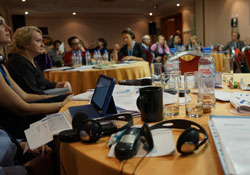Training toolkit for alcohol screening and brief intervention tested for use in the Russian Federation

WHO
Recent figures indicate that alcohol consumption and alcohol-attributable harm in the Russian Federation is high, and that the burden of alcohol-attributable mortality due to cardiovascular diseases and injuries is cause for particular concern. In fact, more than half of injuries (both intentional and unintentional) in the Russian Federation are attributable to alcohol. Identifying individuals who drink at harmful levels and providing advice on limiting alcohol consumption – known as screening and brief intervention (SBI) – is an important policy option for health promotion and disease prevention in the European action plan to reduce the harmful use of alcohol 2012–2020. WHO promotes the Alcohol Use Disorders Identification Test (AUDIT) to identify individuals who are drinking at harmful levels.
WHO/Europe held a pilot training workshop on SBI on 12–13 December 2016 in Moscow, Russian Federation. It aimed to test a training toolkit amended from one originally developed within the Monitoring of national policies related to alcohol consumption and harm reduction (MOPAC) project, funded by the European Commission, in order to ensure its applicability and appropriateness for use in primary health care settings in the Russian Federation.
Developing training skills through role playing
The workshop focused on equipping participants with the skills necessary to deliver trainings for trainers in SBI, and involved short lectures on different modules as well as interactive role-playing activities. Dr Lars Møller and Dr Lisa Schölin from WHO/Europe opened the session. Dr Niamh Fitzgerald from the University of Stirling, United Kingdom (Scotland), and Dr Peter Rice from Scottish Health Action on Alcohol Problems, United Kingdom (Scotland), delivered the training modules.
The training was developed in close collaboration with the Russian Federation’s National Research Centre for Preventative Medicine, Research Institute on Addictions, and V. Serbsky Federal Medical Research Centre of Psychiatry and Narcology. It included participants from the Moscow, Tver and Yaroslavl oblasts of the Russian Federation, as well as from Uzbekistan. These participants will use their new skill set to train practitioners within the Russian Federation’s primary health care system to deliver SBI.
Workshop leaders placed an important focus on understanding how the training toolkit can be successfully adapted to the Russian context, and participants provided feedback on aspects that need further consideration. Dr Boris Gorny, Senior Researcher at the National Research Centre for Preventative Medicine in Moscow, said: “Our centre is planning to implement SBI into the primary health care system and this training was very useful for us. A main challenge in implementing SBI is the lack of skills in motivational interviewing, so a strong focus on these skills is essential within the training.”
WHO/Europe organized the workshop in the context of the Project on the prevention and control of noncommunicable diseases, financed by the Ministry of Health of the Russian Federation.



